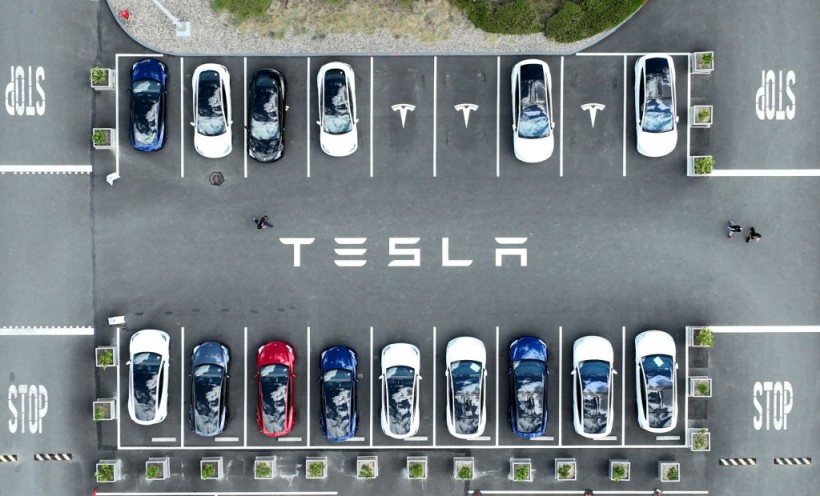Several automakers are giving Tesla a run for its dominance in the US market with their new electric vehicle models, eroding a small portion of the EV giant's dominance, as per national vehicle registration data.
Data gathered by S&P Global Mobility reveals that in the first nine months of 2022, Tesla continued to have a 65% share of the expanding electric vehicle industry.
However, rivals made significant gains in the sticker price band below $50,000, where Tesla hardly competes, according to a report by AP.

(Photo : Justin Sullivan/Getty Images)
FREMONT, CALIFORNIA - APRIL 20: In an aerial view, Tesla cars sit parked in a lot at the Tesla factory on April 20, 2022 in Fremont, California.
Declining Market Share
Tesla held around 80% of the EV market from 2018 to 2020. According to Stephanie Brinley, an associate director for S&P, its proportion fell to 71% in 2021 and has been declining ever since.
S&P Global Mobility noted that Tesla's position is shifting as new, various affordable options become available that offer comparable or superior technology and production quality.
The data provider adds that with growing interest in the EV market, Tesla's dominance in the market share is expected to be challenged over time.
According to S&P, the market share of electric vehicles in the US has increased by 2.4 percentage points this year, reaching 5.2% of all light vehicle registrations.
Approximately 65%, or 340,000, of the 525,000 electric vehicles registered IN the first nine months of 2022 were Teslas, as per S&P's data.
Brinley noted that even with the reduced market share, Tesla will continue to increase its sales as more consumers find the EV sector attractive.
She adds that the automaker will continue to dominate so long as rivals are constrained by production capacity.
Tesla's rivals such as GM, Kia, Hyundai, Volkswagen, and Ford are currently unable to run their facilities at full capacity to meet EV demands due to a lack of computer chips and other parts.
At the upper end of the market, Tesla is also up against rivals such as Rivian, Polestar, Audi, Lucid, and Mercedes-Benz, as per AP.
S&P said that there are currently 48 EV models available for purchase in the US, and by the end of 2025, that number should increase to 159.
Read Also: Tesla Update Release Notes Are Reportedly on its Way to its Mobile App
What's Next for Tesla?
S&P also predicts Tesla's light-vehicle model portfolio in 2025 will be the same as it is now, except for the Cybertruck pickup truck that will be unveiled next year and a new Roadster that will be released at an undisclosed time.
Additionally, S&P discovered that the majority of customers who have purchased EVs previously owned Honda or Toyota automobiles.
Both firms produce fuel-efficient internal combustion and hybrid vehicles, but they have been hesitant to introduce EVs in the US. Toyota has one electric model and Honda doesn't have one yet.
More than half of all electric car registrations were for Tesla's Model Y compact SUV and Model 3 small sedan, according to Brinley. Third place went to Ford's Mustang Mach-E, followed by two more Teslas, the Model S sedan, and the X SUV.
Related Article: Tesla Enters Top 3 Best-Selling EV Brands in China - Plug-In Car Sales Up by 70%?










